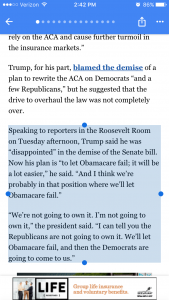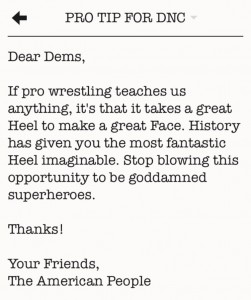I don’t wanna belabor the point, but this tweet got me thinking:
Part of the reason this story took so long to go from this first longhand page to hitting newsstands was because, over the course of the winter that followed that tweet, I was steadily loosing my mind.
Since my adolescence I’ve always had seasonal affect issues, my mood steadily sinking until February—I’m from Michigan; Bob Hicok famously characterizes us as “a people who by February / want to kill the sky for being so gray“—then rebounding with the thaw. Lots of people are like that, especially here; no big. But that year the mood never rebounded; it just sank and sank and sank. I ate more sugar and drank more coffee and skateboarded as much as I could, and soldiered on. But by summer the hole was too deep. Once I’d slam a coffee and another coffee, eat some cookies, skate hard, and be OK. But by July I’d skate so hard I was seeing stars and woozy, and 20 minutes later feel like crap and be desperate to go back to the skatepark. My speech was getting slow and ponderous, my behavior erratic. I got in a fight with my wife over something—I can’t even recall what, something our son had done—and lost my temper. I don’t remember what I said, just that I was in the backyard screaming, my chest collapsing, so angry I was dry-heaving and chanting “I’m sick; I’m sick; I’m sick.”
I didn’t want to be alive any more, but I couldn’t stand the idea of being separate from my children, and the thing running constantly in my head was how I could get careless enough to be killed in an accident where my life insurance would still pay off. Then my family would be on easy street and not burdened by me; my kids would be able to afford college, my wife would own our house outright, and I wouldn’t have to be me anymore, because I wouldn’t have to be at all. And being, it had become apparent, was my core problem.
PRO-TIP: If you need to quickly diagnose depression that has become dangerous, just ask them: “If you could push a button and have never existed at all, would you do it? No pain, no trauma, no one mourning you, just *poof!* and you never were.”
If the answer is “Yeah, sure,” then that person needs to talk to a doctor very, very soon.
At any rate, by the time I had that screaming fit I had already made an appointment to talk to a doctor—something that I’d kept a secret for reasons I can’t really explain any more, because they make no fucking sense; I’d made that appointment under false pretenses, telling my doctor I’d re-injured my ankle—the whole point is that nothing I was doing then made a lot of sense.
But part of that logic had to do with this poisonous, murderous goddamn myth we have that taking meds for your psychiatric illnesses is somehow “weak” or “unnatural” or damages the purity of your artistic fucking whatever.
I wrote 50,000 words of stories while my brain was collapsing that just aren’t much of anything. I sat on revisions of my novella “Where There is Nothing, There is God” (which was in Asimov’s in 2016, and was a finalist for the Asimov’s Award) for a goddamn *year.* I’d sent it around, got feedback from Ann VanderMeer at Tor and C.C. Finlay at F&SF—really good advice, advice that ultimately made it the strong story it was—and then did nothing for a full calendar year. I wrote “There Was a Crooked Man…”, put it through my writing group, got great feedback, and then just sat on it.
And I have no idea why.
Or, more to the point, I know precisely why: Because my brain had drifted from doing a fairly crappy job of managing serotonin to not really bothering to manage it at all.
I started taking 50mg of Sertraline every morning about two years ago (with the ongoing support of a psychiatrist). It’s cheap, I haven’t suffered major side effects, it’s been really good for my personal relationships, and has spared my wife and children having to plan and attend my funeral—and it’s done fuckall to harm my “art”:
This story, “There Was a Crooked Man…”, saw the better part of its  revision after I went on meds. The last three pieces I’ve sold—Expiration Date, “Whatever Comes After Calcutta” (forthcoming in F&SF) and “In the Sharing Place” (sold to Asimov’s)—were entirely written on anti-depressants. These latest pieces are among the best work I’ve done, precisely because (*SPOILER ALERT!*) it’s a lot easier to do good work when you aren’t struggling to keep being alive.
revision after I went on meds. The last three pieces I’ve sold—Expiration Date, “Whatever Comes After Calcutta” (forthcoming in F&SF) and “In the Sharing Place” (sold to Asimov’s)—were entirely written on anti-depressants. These latest pieces are among the best work I’ve done, precisely because (*SPOILER ALERT!*) it’s a lot easier to do good work when you aren’t struggling to keep being alive.
If you need help, please get help. Needing psych meds is no more a moral failing than needing a cast when you break your leg, and seeing a therapist isn’t touchy-feely “snowflake” BS any more than seeing a physical therapist after you wreck your car is touchy-feely bullshit. Your brain got injured, you need some medicine and therapy to get it back on track; that’s fine. Go do that thing. Don’t waste ~300 days that you could spend Getting Things Done or hanging out with your kids or having a beer or reading or playing video games. Go get well; if that’s not possible (because, the fact is, it often isn’t), at least get better.



 novella, Expiration Date. (
novella, Expiration Date. (
 for download in the
for download in the 